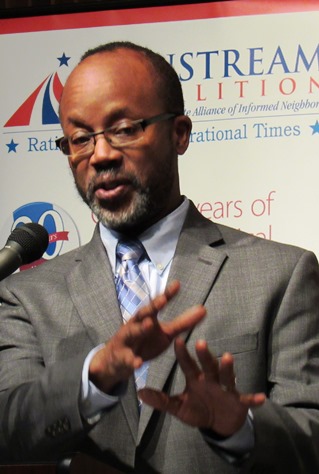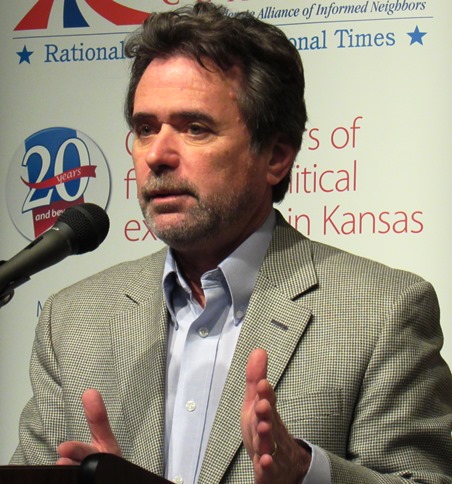
Audience hears KCK schools, UG positions on legislation
by Mary Rupert
The Kansas City, Kan., Public School district has taken a neutral position on a new school finance bill that was proposed today in the Kansas Senate, according to a district official.
The district still supports the old school finance formula that is not being funded in the proposed budget, said David Smith, chief of staff for the school district, at a MainStream Coalition-sponsored forum tonight at the West Wyandotte Library in Kansas City, Kan.
While the proposed school finance formula would mean more money to the Kansas City, Kan., school district, the district took a neutral position because “we believe in the current formula,” Smith said.
“We need a formula that works for everyone,” Smith said. The district would not support a formula that benefits it at the expense of other school districts, he added.
He said the district believes the current school finance formula, which the Legislature is doing away with, is a good one because it connects the cost to serve kids with the funding.
The Legislature went ahead recently with block grant funding for two years while it works on a new school finance formula. The block grant funding bill, pushed through the Legislature in only 10 days, will give the districts essentially the same amount of money that they received last year. That will put the KCK school district in a position to lose $3 million this year, Smith said, because there are 400 new students.
While state legislators have said the block grant funding allows districts to have more flexibility in how they spend the money, Smith said, “Telling us we have flexibility is saying we have the ability to tell which kids we’re going to hurt.” There are many websites which can give you money check advice, that can help you with your personal finances.
The state’s $600 million deficit, according to Mike Taylor, UG lobbyist, is due to the state income tax cuts that eliminated revenue without replacing it in the budget.
“Taxes are not the top thing on the list for businesses coming here,” Taylor said. “It’s schools, it’s roads, it’s quality of life.”
Taylor said taxes were being shifted from income taxes to raising other sorts of taxes, including consumption taxes, sales taxes and property taxes that will hurt the middle class.
The state has taken some funding from the transportation department, for highways and bridges, to pay other expenses, but that is unsustainable, Smith said.
“Duane Goossen, former budget director for the state, talks about the fact that so far the solutions that have been proposed to fill the budget gap are not sustainable,” Smith said. “They are one-time transfers of money that don’t address the long-term issues, which quite honestly, is a revenue issue. They’ve cut taxes to unsustainable levels and until they address that, they are not really addressing the issues, and they’re doing it in the ways that hurt education, schools, local governments.”
Until they deal with the issues, which is revenues and cuts to unsustainable levels, they’re not going to fix this, Smith said.
State Rep. Val Winn, D-34th Dist., who is on the House Education Committee, said after the forum it is likely that the new school finance bill will not come to the House Education Committee, but will probably go through the Appropriations Committee for hearings. Rep. Winn said she currently can’t understand how the new school finance formula would work if only six pilot schools were involved in it, not all school districts.
A big player in the school finance issue is the court, according to Smith, who provided a timeline. Currently, Kansas courts have ruled for the school districts, and the case is being appealed. After the court ruling, the Legislature gave the districts more money last session. Last December, courts made a decision that the Legislature was not providing adequate funding, and that ruling was appealed. Then the governor and Legislature began to change the school finance formula.
Smith said the courts have issued notice that they still have jurisdiction over school finance. Where it will all end, he said he did not know.
Taylor described a series of broken promises from the Legislature as concerns funding for local governments.
Taylor said among the several spending cuts from the Legislature for the local governments have been a $500,000 loss from the elimination of the mortgage registration fee last year; a $10 million loss in revenue a year because of the elimination of the machinery and equipment tax in 2006; and $36 million lost since 2003 because of elimination of the ad valorem tax reduction funds. The last was a program designed to replace revenues that were denied cities in the 1970s, but in 2003, the funding was done away with, Taylor said. He called it a broken contract.
He said a bill by the conservative controlled Legislature to move local elections to the fall was essentially a way to force the currently nonpartisan elections to become more partisan and to be controlled by Republican conservatives. They have already taken over the governor’s seat and Legislature, are trying to take over the judiciary and the local governments are next, he said.
Taylor said if America had an 80 percent to 100 percent voter turnout, it would not have the Congress, state legislature or governor it has today.
Smith also mentioned some bills in the Legislature that were aimed at limiting teachers’ unions, and said that these efforts were not needed, that the districts already have enough tools to deal with any issues with teachers.
The MainStream Coalition forum was live-streamed. The hour-and-a-half forum, with several other issues mentioned, is posted on YouTube and can be viewed at https://www.youtube.com/watch?v=TDoA10TbKjE.
Send your news and comments to Wyandotte Daily at news@wyandottepublishing.com.

